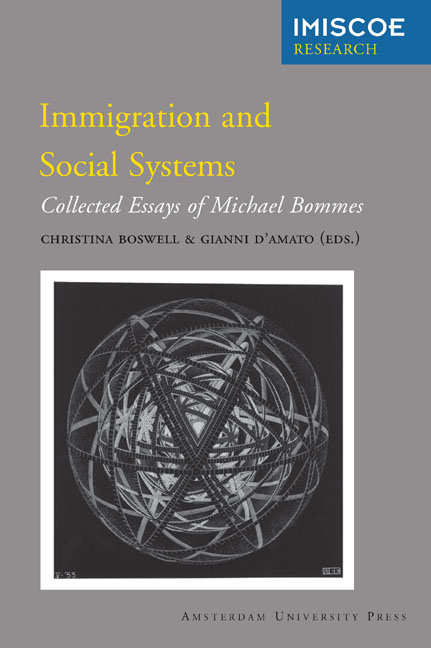Book contents
- Frontmatter
- Contents
- Foreword
- Preface
- Introduction
- 1 Migration in Modern Society
- 2 National Welfare State, Biography and Migration: Labour Migrants, Ethnic Germans and the Re-Ascription Of Welfare State Membership
- 3 Systems Theory and the ‘Ethnic Inequality’ of Migrant Workers
- 4 Welfare Systems and Migrant Minorities: The Cultural Dimension of Social Policies and its Discriminatory Potential
- 5 Transnationalism or Assimilation?
- 6 ‘Integration takes Place Locally’: On the Restructuring of Local Integration Policy
- 7 Illegal Migration in Modern Society: Consequences and Problems of National European Migration Policies
- 8 General and Specific Characteristics of Networks: (with Veronika Tacke)
- 9 National Paradigms of Migration Research: (with Dietrich Thränhardt)
- References
- Other IMISCOE Titles
3 - Systems Theory and the ‘Ethnic Inequality’ of Migrant Workers
Published online by Cambridge University Press: 09 January 2021
- Frontmatter
- Contents
- Foreword
- Preface
- Introduction
- 1 Migration in Modern Society
- 2 National Welfare State, Biography and Migration: Labour Migrants, Ethnic Germans and the Re-Ascription Of Welfare State Membership
- 3 Systems Theory and the ‘Ethnic Inequality’ of Migrant Workers
- 4 Welfare Systems and Migrant Minorities: The Cultural Dimension of Social Policies and its Discriminatory Potential
- 5 Transnationalism or Assimilation?
- 6 ‘Integration takes Place Locally’: On the Restructuring of Local Integration Policy
- 7 Illegal Migration in Modern Society: Consequences and Problems of National European Migration Policies
- 8 General and Specific Characteristics of Networks: (with Veronika Tacke)
- 9 National Paradigms of Migration Research: (with Dietrich Thränhardt)
- References
- Other IMISCOE Titles
Summary
Introduction
Differentiated subdisciplines of sociology mediate their relationship to general sociological problems of theory and problems of social theory in terms of the preservation of their own core issues. This is the case for the sociology of the family, industrial sociology, the sociology of social conflicts, the sociology of migration, and also for the sociology of social inequality and the associated analysis of social structure. The sociology of social inequality, previously the sociology of class and stratification, has always, in its more sophisticated variants, claimed a central position for the description of modern society and the theoretical understanding thereof. A major role is played here by attempts at explaining inequality with a traditional, social-theory orientation. In keeping with this, there is a tendency to avoid theoretical traditions which do not accord the issue of social inequality a sufficiently central position, in the sense of considering social inequality the immediately obvious starting point for the development of sociological theory. The individualization debate in the 1980s, however, has eroded the claims of inequality studies. One of its results was the gradual disintegration of a theoretical concept of inequality. The procedures for measuring inequality, increasingly elaborate in their methodology, reflected the diversification of inequalities and the extent to which the observation and description thereof depended on context.
Given this background, anyone wishing to bring sociological systems theory – of all theories – into play must demonstrate plausibly that issues in inequality studies can be adequately dealt with even when inequality no longer forms the immediate starting point for the development of sociological theory. It is possible, with certain modifications, to make Luhmann’s theory of functional differentiation productive for the analysis of social relations of distribution and corresponding semantics of inequality. This theory shows that modern society has a problem of distribution and equality, precisely because there is no structural provision for solutions to this within its primary form of differentiation. In terms of functional differentiation, questions of distribution and inequality constitute secondary issues which nonetheless require resolution. These solutions are not, however, generated in the individual function systems, but in organizations. This will be shown in the first part (sections 2 and 3).
- Type
- Chapter
- Information
- Immigration and Social SystemsCollected Essays of Michael Bommes, pp. 59 - 82Publisher: Amsterdam University PressPrint publication year: 2013
- 1
- Cited by



